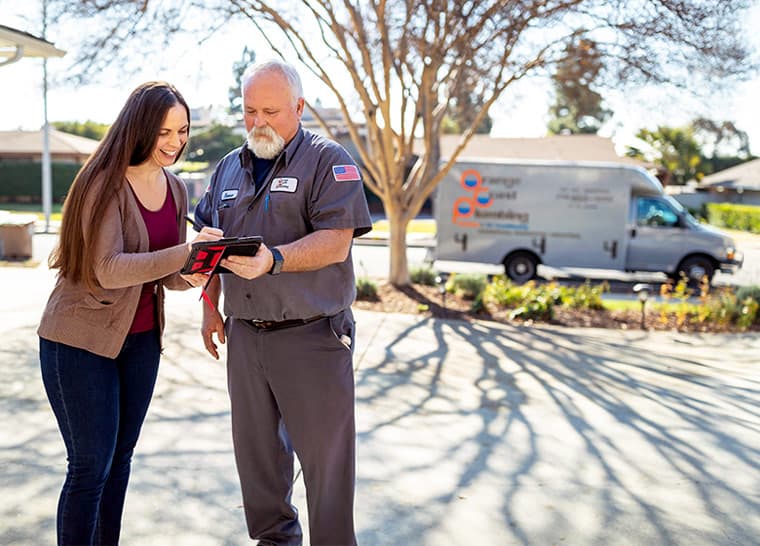Eggs — what a way to start the day!
Except when the eggs enter the bathroom water supply and quickly lose their freshness.
We’re speaking metaphorically, of course. But few things are less appetizing than the smell of rotten eggs, and when your hot water carries that stench, well, do you really want to bathe in it? We’re guessing “no.”
What Makes Hot Water Smell Like Rotten Eggs?
Fortunately, this dire olfactory assault isn’t a threat to health. But it is an offense to your senses, and if you’re like most people, you’ll want to correct it. Giving the devil his due may not include showers.
There’s a single reason for the rotten egg smell, sulfur bacteria — so-called because they produce sulfur — and there are two possible sources:
- Your water heater
- Your water supply
Door number 1 holds the grand prize. When your showers smell like an outing at Sulphur Springs, nine times out of ten, your water heater begs for an inspection.
1. A Water Heater’s Warm Water Can Incubate Sulfur Bacteria
Water heaters should be set to about 120 degrees F. Anything higher carries the risk of scalding at the other end of the pipe.
If the setting seems low, it is — for bacteria. For humans, it’s more than enough for showers, dishes, and other household tasks where hot water is involved.
Sulfur bacteria thrive in that hot but not-too-hot environment, pitch their tents, and propagate. They have nothing better to do.
Why sulfer bacteria love hot water tanks
Your water heater’s anodes help to prevent corrosion. They also produce hydrogen ions that combine with oxygen to form sulfuric acid. That’s a breeding ground for bacterial growth.
The bacteria plant their flag on your water heater’s anodes, feast on hydrogen ions, and propagate faster than rabbits in springtime.
The bacteria produce hydrogen sulfide gas
Hydrogen sulfide gas is a by-product of the bacteria’s daily routine. It builds up in the heater, and when you turn on your hot water, it wafts out of the fixture like an Easter parade, complete with rotten egg stench instead of candy.
Dealing with sulfur bacteria
Bleach is one way to kill bacteria, but it corrodes the anodes and shortens their lifespan.
A better solution is to set your water heater to 160 degrees or more for several hours. This water temperature is high enough to kill bacteria; it’s also dangerous for humans and their pets. So if you take this approach, resolve to put all hot water activities on hold until you turn down the dial.
Draining and flushing your water heater routinely — at least once a year — will remove sediment build-up that promotes bacterial growth. It will lengthen your water heater’s life and keep it running optimally. But at this point, it won’t eliminate your rotten egg smell unless you apply chemicals or increase the water temperature to a point where you may not be comfortable.
So you may want to call a plumber for a service call. Plumbers have access to specialized chemicals unavailable to the general public. The plumber will treat the tank for bacteria, flush it, descale it, and replace any damaged or worn parts (like anodes).
2. Well Water Can Be a Bacteria Source
Well water is more likely than municipal water to contain sulfur bacteria. Municipal water is treated, especially with chlorine. Well water isn’t.
However, that doesn’t leave your city water supply off the hook. Depending on your location, your water may arrive without much chlorine left.
Old iron distribution systems can create an ideal environment for bacteria growth, which quickly depletes oxygen and chlorine. Then, when the water enters your house, it’s ripe and ready to stink things up.
3. A Water Softener Can Make Matters Worse
Softened water increases water’s conductivity, which also increases hydrogen sulfide production.
Water softeners themselves are welcoming hosts for bacteria. Softeners contain little oxygen; bacteria prefer oxygen-deficient environments.
With softened well water, a smelly water problem is likely unless you take aggressive measures to maintain your water tank.
What Can You Do If Your Water Smells Like Eggs?
- Turn on the cold water for a smell test. Then do the same for hot water. This test will confirm or clear your water heater as a suspect.
- Hire a professional to flush your water heater and sanitize it. Don’t attempt this as a DIY repair; you may damage the heater. Ask the plumber to replace your anode with a zinc-aluminum anode to reduce the odor problem.
- A powered anode may help with a stubborn sulfur problem. This device uses electricity to produce chlorine dioxide, eliminating hydrogen sulfide without damaging anodes.
- If you have a well and experience a consistent sulfur aroma, consider installing an ultraviolet light water treatment system to neutralize bacteria in the water supply before it reaches your house.
- Finally, if all else fails, contact your municipal water supplier for assistance.
FAQs: Why Hot Water Smells Like Sulfur
Q: Why does my hot water smell like rotten eggs, but my cold water doesn’t?
This often indicates that sulfur bacteria are proliferating in your water heater. Cold water doesn’t support bacterial growth in the same way, so any odor is usually confined to the hot water supply.
Q: Can I fix the rotten egg smell in my water by myself?
While you can flush your water heater or adjust the temperature, effectively resolving a persistent rotten egg smell often requires professional intervention. A qualified plumber can implement the correct procedures to sanitize your water supply and recommend the best long-term solutions.
Q: Is it safe to drink water that smells like sulfur?
While the smell can be unpleasant, sulfur bacteria generally don’t pose a significant health risk. However, we advise that you contact a water treatment professional for testing and potential treatment.
Q: How often should I flush my water heater?
Flush your water heater at least once a year to remove sediment buildup and prevent bacterial growth. Regular maintenance will also prolong its lifespan.
Q: What type of anode should I replace my current one with?
A zinc-aluminum anode can reduce the odor of sulfur bacteria. This type of anode is more resistant to corrosion and can minimize unpleasant smells.
Q: Can installing a water softener prevent a sulfur smell?
While a water softener improves water quality, it may not prevent sulfur smells and can sometimes exacerbate the issue. Regular maintenance and proper water heater settings are essential and are the best way to deter bacteria growth.
Q: What should I do if I suspect my municipal water supply is contaminated?
Contact your local water supplier immediately. They can perform tests and tell you how to address the issue.
Q: Are there any home remedies to eliminate sulfur smell?
Some home remedies include flushing the water heater with a vinegar solution, which may help reduce bacteria, or using hydrogen peroxide for sanitation. However, these methods aren’t as effective as professional treatments.
Q: Does heating my water to a high temperature always solve the sulfur problem?
Increasing the water temperature to 160 degrees or higher can kill sulfur bacteria, but is dangerous and not recommended. Please consult a professional plumber for safe and effective solutions.
Q: How do I know if my water heater is the cause of the sulfur smell?
Conduct a simple hot water smell test to determine if the issue originates from your water heater. If there’s still a strong odor after flushing and sanitizing, it may be due to other factors such as well water contamination or old plumbing systems. A professional plumber can help identify the source of the problem and offer solutions.


